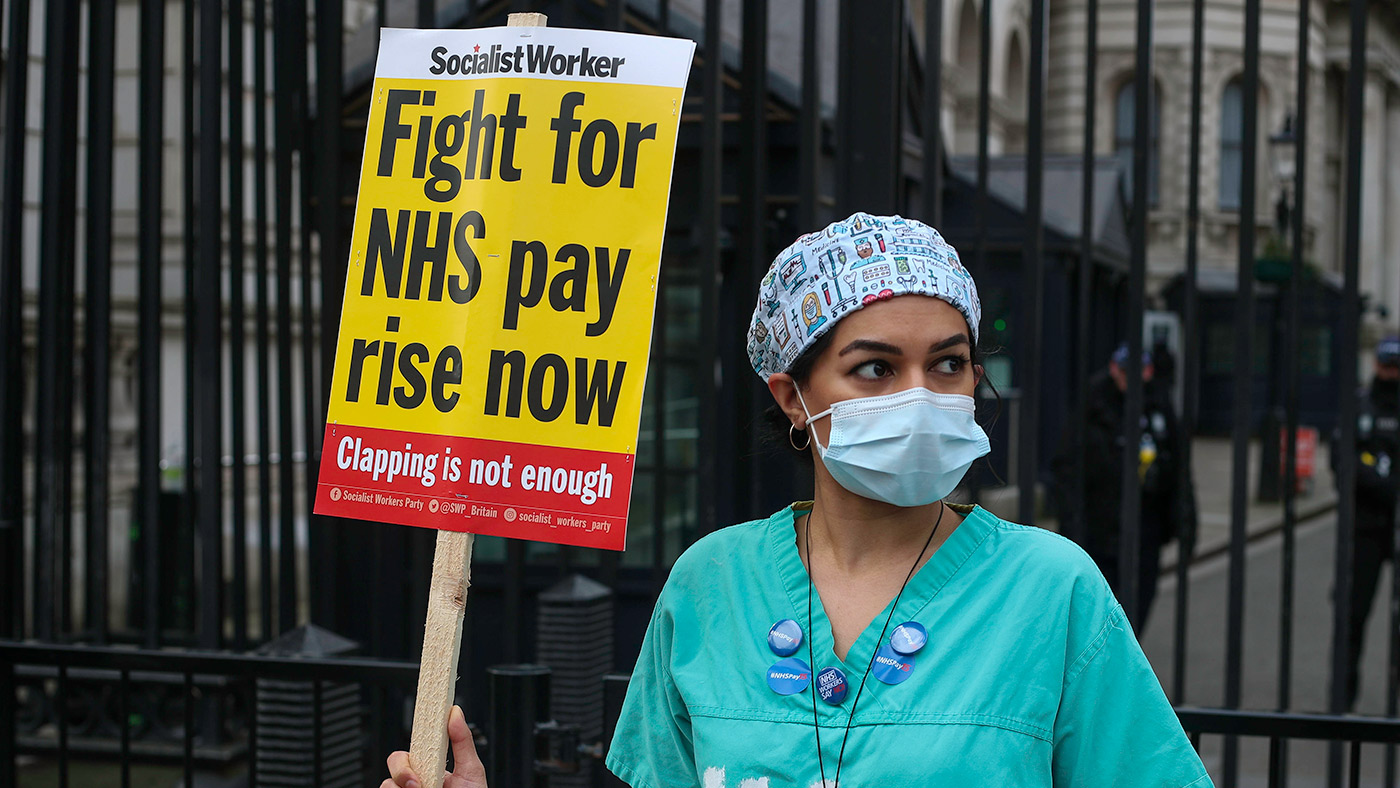‘The UK has become culturally work-shy’
Your digest of analysis from the British and international press

- 1. It’ll take more than higher pay to get work-shy Britain working
- 2. Journalists are being targeted by the likes of Tommy Robinson – but we will never be silenced
- 3. GPs have become the new fall guys for government failures
- 4. Do I really have to watch Squid Game?
- 5. Face it Boris Johnson, you’re not in control
A free daily email with the biggest news stories of the day – and the best features from TheWeek.com
You are now subscribed
Your newsletter sign-up was successful
1. It’ll take more than higher pay to get work-shy Britain working
Jeremy Warner in The Telegraph
on absent natives
“Whisper it, for fear of causing offence, but we have a culturally work-shy labour force that has grown used to migrants filling the jobs that indigenous Brits don’t want to do,” believes Jeremy Warner. Writing for The Telegraph, he explains that the UK enjoys record numbers of staff vacancies, resulting in “plenty of competition for workers, and in many cases steep increases in wages”. However, he continues, “if we look at the underlying reasons for these shortages, they have as much to do with natives absenting themselves from the workforce as the deterrent effect of Britain’s new immigration policies”. He says the hospitality sector is in particular trouble. “I’m going to get myself into a lot of trouble for saying this,” he says, “but Brits do not on the whole like working unsocial hours, including evenings and weekends.” He forecasts that wages will eventually rise but that will mean higher prices, putting many mid-range establishments out of business. So, he concludes, “we’ll just have to get used to higher prices, less choice, and for many of us, doing the sort of jobs we’ve been turning our noses up at”.
The Week
Escape your echo chamber. Get the facts behind the news, plus analysis from multiple perspectives.

Sign up for The Week's Free Newsletters
From our morning news briefing to a weekly Good News Newsletter, get the best of The Week delivered directly to your inbox.
From our morning news briefing to a weekly Good News Newsletter, get the best of The Week delivered directly to your inbox.
2. Journalists are being targeted by the likes of Tommy Robinson – but we will never be silenced
The Independent editorial
on an unusual case
“The five-year ‘stalking order’ passed down by the courts against Tommy Robinson, the co-founder of the English Defence League, is an unusually long one,” concedes an editorial in The Independent. “Then again, Robinson has an unusually long record of breaking the law and attempting to intimidate The Independent’s home affairs and security correspondent, Lizzie Dearden,” it adds. After the far-right leader was sentenced for stalking the journalist, Dearden’s paper says the punishment “still allows Robinson complete freedom to exercise his right to speech and respond to any media reports or criticism of him”. He may not have understood before that the expression ‘right to reply’ “does not equate to turning up on a reporter’s doorstep at 10pm and yelling through the intercom”, it continues, but “perhaps he does now”.
A free daily email with the biggest news stories of the day – and the best features from TheWeek.com
3. GPs have become the new fall guys for government failures
Gaby Hinsliff in The Guardian
on a worrying warpath
Someone recently arrived at Gaby Hinsliff’s local surgery for a routine non-urgent test “maskless, coughing and with a temperature”. She explains that, “despite the risk of infecting the whole building, they had still been startled to be sent home”. The “nervous arm’s-length handling of patients… exists for good reason”, she adds, as the “Tory press” goes “on the warpath” against GPs. “People will always seek more from their NHS” but “whenever a gap yawns between aspiration and reality, it’s tempting for politicians just to spray the blame around, even if that risks tarnishing people who have risked their working lives on the Covid frontline.” She concludes that, “given the daunting challenge now facing the NHS as it struggles to get waiting lists down”, Health Secretary Sajid Javid “may well need to push health professionals far from their comfort zones in the coming months”.
4. Do I really have to watch Squid Game?
Robert Shrimsley in the Financial Times
on ignoring the zeitgeist
“Apparently I need to watch Squid Game. It is one of those zeitgeist things you have to watch to be part of THE CONVERSATION,” writes Robert Shrimsley in the Financial Times of the hit Korean show streaming on Netflix. And while “I do not like the idea that I may not be part of THE CONVERSATION”, the show is essentially a “snuff series” which “takes on the veneer of an emotional class critique of economic plight within capitalist society but with added throat slashing”. “This then is the dilemma,” says Shrimsley: “cultural relevance or contented ignorance”. And although the show is “allegedly a biting commentary on capitalist society”, Shrimsley writes, “I can’t help noticing that there are no democratic capitalist societies actually staging murderous games for the enjoyment of viewers.”
5. Face it Boris Johnson, you’re not in control
James Forsyth in The Times
on outside forces
“The phrase ‘take back control’ was perhaps the most potent weapon Boris Johnson deployed during the EU referendum,” writes James Forsyth in The Times. “Three factors will play a huge role in determining what the next few months will be like: inflation, energy shortages and geopolitical tensions,” he continues. But “Johnson has little to no control over any of these forces”, something he is “loath to admit”. Cabinet ministers are worried over Johnson’s claims that supply shortages are “part of his transition to a high-wage economy”, a claim which “suggests the government has far more control over events than it actually does”. ”What if the pain is not transitory, but longer-lasting? What if (as many economists suggest) there are no worker shortages in most of the economy – so no real pay rises to follow?” Forsyth concludes: “For good or ill, much of the country’s fate is out of Johnson’s control.”
-
 The mystery of flight MH370
The mystery of flight MH370The Explainer In 2014, the passenger plane vanished without trace. Twelve years on, a new operation is under way to find the wreckage of the doomed airliner
-
 5 royally funny cartoons about the former prince Andrew’s arrest
5 royally funny cartoons about the former prince Andrew’s arrestCartoons Artists take on falling from grace, kingly manners, and more
-
 The identical twins derailing a French murder trial
The identical twins derailing a French murder trialUnder The Radar Police are unable to tell which suspect’s DNA is on the weapon
-
 Captain Tom charity closes to donations amid daughter’s pool row
Captain Tom charity closes to donations amid daughter’s pool rowSpeed Read Hannah Ingram-Moore to appeal council order to demolish spa complex at her home
-
 Boris Johnson shocks UK by resigning from Parliament
Boris Johnson shocks UK by resigning from ParliamentSpeed Read
-
 Bees delay flight for three hours
Bees delay flight for three hoursfeature And other stories from the stranger side of life
-
 The Week Unwrapped: Sex and health, the Earth’s core and another new year
The Week Unwrapped: Sex and health, the Earth’s core and another new yearpodcast Is the NHS failing British women? What’s going on at the centre of our planet? And what’s in a date?
-
 National nursing strike: should the patient ‘always come first’?
National nursing strike: should the patient ‘always come first’?Talking Point Recent YouGov poll found that 65% of public approves of strike action
-
 The science behind lab-grown blood
The science behind lab-grown bloodfeature Development of ‘absolute game changer’ could help those with sickle cell and other conditions
-
 ‘The UK’s malaise will not end with the Prime Minister’s exit’
‘The UK’s malaise will not end with the Prime Minister’s exit’Instant Opinion Your digest of analysis from the British and international press
-
 ‘Police tactics are not getting worse, they are simply being filmed’
‘Police tactics are not getting worse, they are simply being filmed’Instant Opinion Your digest of analysis from the British and international press